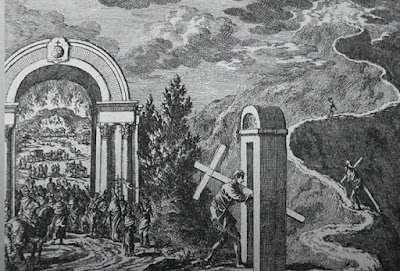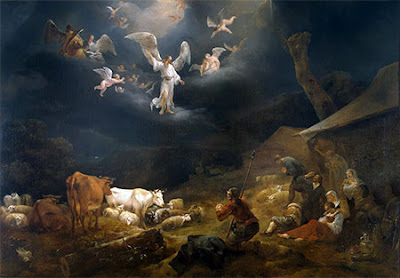Social media has provided a mask of
anonymity that encourages us to write things that we would self-censor
in person. In augmented reality, we create avatar-personas that we allow to be
much more judgmental and verbally hostile than we are in real-life. The social
media feed-back loop that reinforces and rewards our arrogant attitudes is ever
present and urges us to write more and more outrageous things and to
espouse shocking ideas. We have been brought to a place where so much is
considered “unforgivable” and so many are “cancelled”, that many people fear
for their future.
In this social/political/cultural
atmosphere we’d do well to remember the virtues that Judeo-Christianity has advanced
to humanity since the beginning of recorded time.
Humility: If there’s one virtue that Judeo-Christianity
has promulgated, it is humility. In the face of an Almighty God, in the Books
of the Old and New Testament, the stories that unfold repeatedly teach the lesson
of humility. Humility is at odds with arrogance. The arrogance of knowing that
the position/opinion/values that one holds are absolutely, undoubtedly correct.
Not only correct, but morally true. And that means if another disagrees, they
must be immoral liars. Jesus taught humility in Luke 13:
23 And someone said to
Him, "Lord, are there just a few who are being saved?" And He said to
them, 24 "Strive to enter through the narrow door; for many, I tell you,
will seek to enter and will not be able. 25 Once the head of the house gets up
and shuts the door, and you begin to stand outside and knock on the door,
saying, ‘Lord, open up to us!' then He will answer and say to you, ‘I do not
know where you are from.' 26 Then you will begin to say, ‘We ate and drank in
Your presence, and You taught in our streets'; 27 and He will say, ‘I tell you,
I do not know where you are from; depart from Me, all you evildoers .'28 In
that place there will be weeping and gnashing of teeth when you see Abraham and
Isaac and Jacob and all the prophets in the kingdom of God, but yourselves
being thrown out. 29 And they will come from east and west and from north and
south, and will recline at the table in the kingdom of God. 30 And behold, some
are last who will be first and some are first who will be last."
This idea of thinking that you have a relationship and would
be able to enter only to be told you are not known and to depart must be meant
to impart humility. What could be more direct than to be told that the last
will be first and the first will be last?
Non-Judgment: Christ repeatedly
reminds us that we should not judge. Why? Jesus tells us in Luke 6:
36 “Be merciful, just as
your Father is merciful. 37 Do not judge, and you will not be judged; and do
not condemn, and you will not be condemned; pardon, and you will be pardoned.”
It seems so easy, in these times, to judge and condemn others;
so difficult to extend mercy and pardon. But we must consider the humility
necessary to be aware that we are guilty of the very things that we are judging
and condemning. Later in Luke 6 Jesus says:
42 “Or how can you say
to your brother, ‘Brother, let me take out the speck that is in your eye,' when
you yourself do not see the log that is in your own eye? You hypocrite, first
take the log out of your own eye, and then you will see clearly to take out the
speck that is in your brother's eye.”
Forgiveness: It is
Judeo-Christianity that has promulgated the virtue of forgiveness in the
western world. The One God is presented as the highest good, to be reverenced
and followed and emulated. He is described by Moses in Numbers 14:
18 “The LORD is slow to
anger and abounding in loving devotion, forgiving iniquity and transgression.”
When Jesus gives us the template for prayer in Matthew 6 He
says:
12 “…forgive us our
sins, as we have forgiven those who sin against us…
14 If you forgive those
who sin against you, your heavenly Father will forgive you. 15 But if you
refuse to forgive others, your Father will not forgive your sins.”
Love: The binding force
between all the other virtues is Love. Love provides the humility to consider
others before ourselves. Love curbs and softens our hearts towards those whom
we would judge and condemn. Love gives us the moral imperative to let go of a grudge.
When asked what the greatest commandments were, Jesus responded in Mark 12:
29 “…This is the most
important: ‘Hear O Israel, the Lord our God, the Lord is One. 30 Love the Lord
your God with all your heart and with all your soul and with all your mind and
with all your strength.’ 31 The second is this: ‘Love your neighbor as
yourself.’ No other commandment is greater than these.”
I have said that Judeo-Christianity holds the key…has always
held the key…to the current social/political/cultural climate. The One God is
to be held in highest esteem and is to be reverenced, followed, emulated, and loved above all
else. Even knowing that it isn’t possible to achieve oneness with God, that the
burden is great and un-bearable, we are ennobled even in the pursuit.
Give Thanks!



